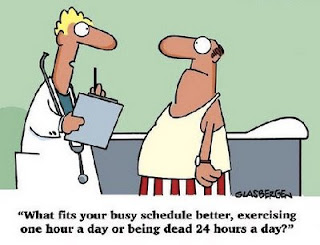Why exercise?

Physical activity can prevent many major illnesses. Evidence shows that regular exercise can:
* promote healthy blood sugar levels to prevent or control diabetes
* promote bone density to protect against osteoporosis
* reduce the overall risk of cancer
* increase levels of HDL or "good" cholesterol -reducing the risk of developing heart disease
* lower high blood pressure-reducing the risk of developing heart disease
* boost the immune system
* boost self-confidence and help prevent depression
* in combination with a balanced diet, help to maintain a healthy weight
What types of activity count?
Many people believe that only vigorous exercise or playing sport counts as healthy activity. Yet substantial health benefits can be achieved from regular activity without the need for special equipment, sporting ability or getting very hot and sweaty.
Moderate intensity physical activity, such as brisk walking, painting, vacuuming and mowing the lawn, all count and are enough to benefit health and prevent illness in adults.
It's possible to achieve your 30 minutes at least five times a week target by making fairly simple changes to your everyday routine - without joining the gym or running a marathon.
Examples of everyday activities that count include:
* walking up stairs instead of using lifts
* walking up moving escalators
* walking instead of driving for short journeys
* doing the housework at double-time
* DIY and gardening
How much physical activity should I do?

For an adult weighing 60kg (132lbs), regular, moderate intensity physical activity means using up about an extra 100 calories (kcal) per day, most days of the week. This is about 30 minutes of activity, such as a 1.5 mile (2km) brisk walk.
If you have previously been inactive, separate sessions of 10 or 15 minutes also count and can help you reach the 30 minute amount
Achieving your goals
Even when you usually enjoy exercising, there will be days when you just can't seem to find the motivation to get active. Here are some practical tips to help keep up your enthusiasm.
* Keep a diary that highlights the sport or activity you do. Note down how far you ran or the match score, your pulse, how you felt, etc. That way you can look back and see how you have improved over time.
* Collect inspiration and stick quotes from coaches, athletes or anyone successful around your house and/or your office. Inspirational stories from people who have achieved against the odds may help - if they can do it, so can you.
* Set yourself some short and long-term goals. Success will provide you with a sense of satisfaction and further motivation to keep up the new lifestyle. Keep your goals: specific; measurable; achievable; realistic; time-based (SMART). For example, rather than saying you'll get fit by summer, start by setting the more specific goal of going to a one hour step aerobics class or an ashtanga yoga class each week.

Staying motivated
When it comes to staying motivated it's just as important to train your brain as it is to train your body. Here are just a few ideas to help you.
* A great way to stay focused is to keep reminding yourself of the reasons you started exercising in the first place. This may include losing excess weight, improving your health or testing yourself in a competition or race.
* Picture yourself achieving your goal, such as completing a race or fitting into smaller trousers - and imagine what it will feel like. Through visualisation these images and feelings will motivate you and will help you achieve them for real.
* Exercising releases chemicals in the brain, like serotonin, that have a strong affect on your mood, helping reduce anxiety, stress and depression. So whenever you don't feel like exercising, try to remind yourself how good you'll feel afterwards.


Comments